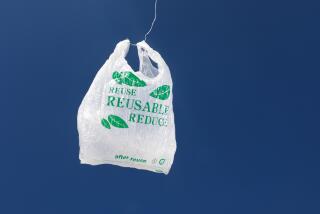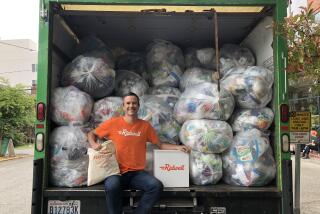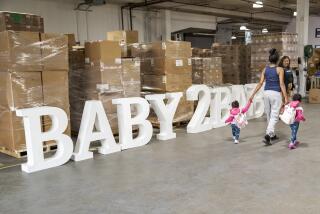Disposable-Diaper Guilt Feeling Recycled
Environmentally conscious parents who reluctantly use non-biodegradable disposable diapers can now take advantage of a service that will pick up soiled paper and plastic diapers and recycle their components.
Babyland Diaper Service of San Diego has started California’s first disposable diaper recycling program, born out of growing concerns that the convenient diapers are adding to the crisis of overflowing landfills.
The service is the result of an unlikely marriage between Babyland, a cloth diaper supplier, and one of its competitors, Weyerhaeuser Co., the nation’s third largest disposable diaper manufacturer.
“We’re pioneers in what I believe is an environmental revolution,” said James Houlihan, president of Babyland. “The desire to provide concrete solutions, not talk, has brought us together.”
Babyland has 300 clients using the recycling alternative compared to 3,000 using its cloth diaper service.
Under the service, which started in February, Babyland vans deliver and retrieve Weyerhaeuser’s Loving Touch disposable diapers weekly in the San Diego area.
The soiled diapers are processed at the Babyland plant, where patented equipment cleans, shreds and separates the diapers into their two major components.
The fluffy absorbent pulp interiors are sent to San Diego-based Fiber Resources Unlimited, where they are compressed, baled and sold to companies manufacturing grocery bags, cardboard boxes, stationary and magazines.
The plastic exteriors are condensed and mixed with other plastics at Western Gold Thermoplastics in Los Angeles. The plastics are typically used to manufacture cassette tapes and nursery flats for carrying plants.
More than 80,000 San Diego babies contribute 4 million disposables a year to landfills. Experts say disposable diapers will remain in landfills for at least 500 years.
County officials have warned that several of the county’s six landfills are rapidly approaching capacity, and state Sen. Lucy Killea (D-San Diego) has led a drive to ban the use of disposable diapers.
The cost of the new service, which varies according to volume, is slightly more expensive than traditional cloth diaper delivery or supermarket disposable diaper brands.
“On average, your general price may run about $2 more to use this service. But, when you factor in the amount Californians are using to pay for solid-waste disposal, it evens out,” said Babyland vice president Diane Kudo.
“Many people are fascinated the first time they hear they can use a disposable diaper that doesn’t have to be used just one time. Parents want to do the right thing,” she said.
More to Read
Inside the business of entertainment
The Wide Shot brings you news, analysis and insights on everything from streaming wars to production — and what it all means for the future.
You may occasionally receive promotional content from the Los Angeles Times.










